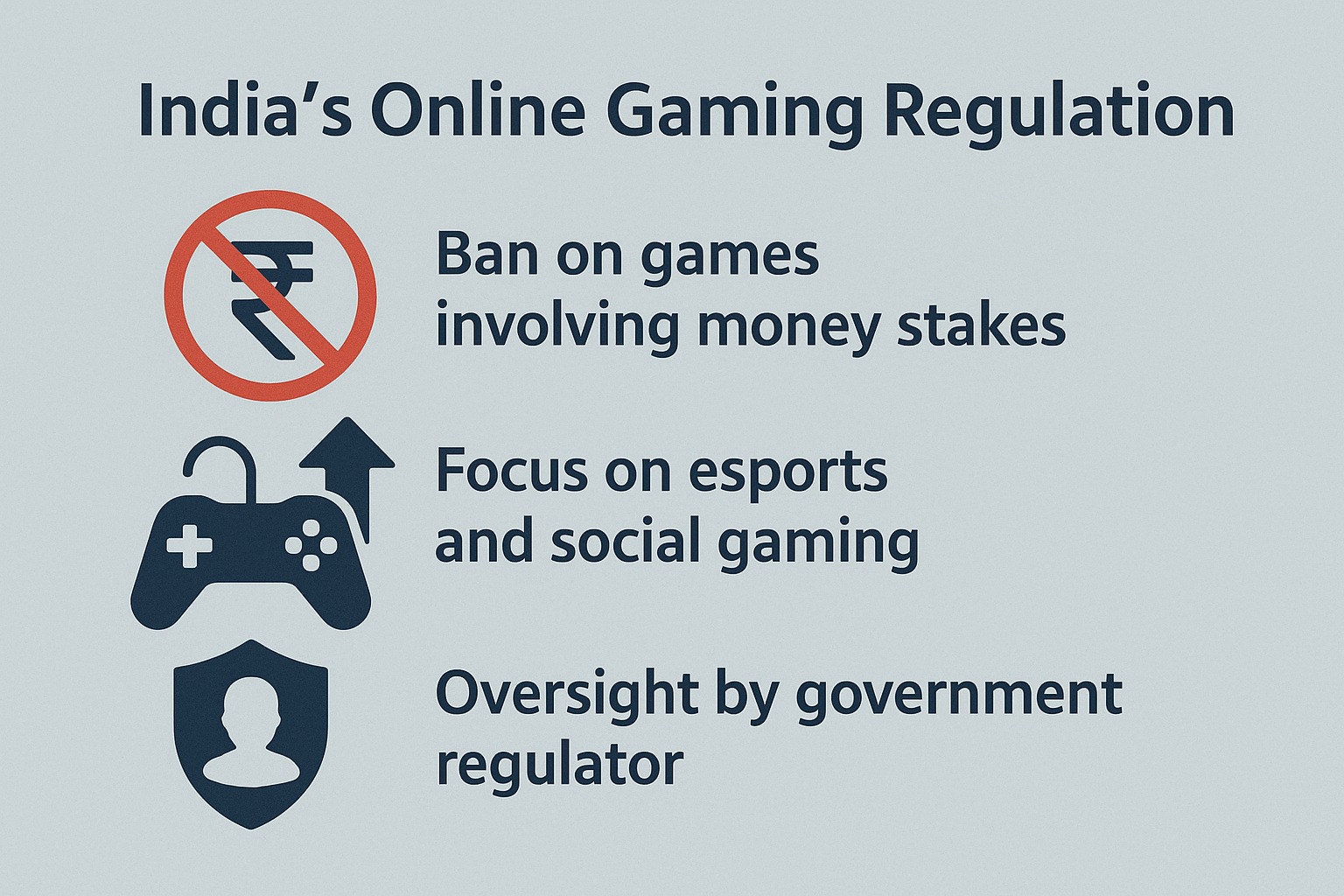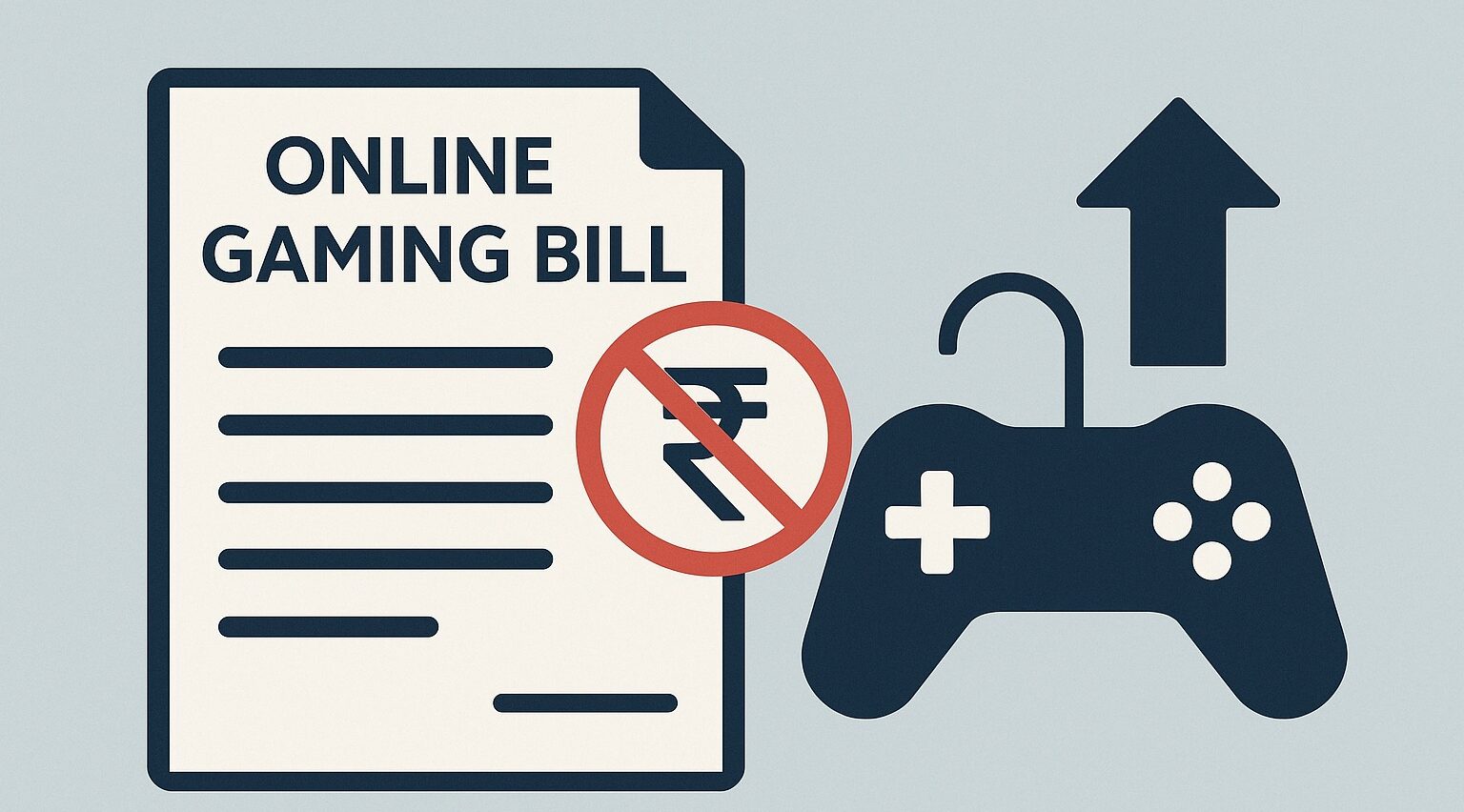Parliament has cleared the Promotion and Regulation of Online Gaming Bill 2025, setting up a sweeping new regime that simultaneously promotes esports and social/educational games while banning all “online money games”, those played by depositing money in expectation of monetary rewards, whether skill-based or chance-based.

The Lok Sabha passed the Bill on Wednesday, August 20, followed by the Rajya Sabha on Thursday, August 21, amid protests by the Opposition .
At its core, the law draws a bright line: esports and non-wager social games are encouraged; real-money gaming (RMG) is prohibited.
The definition of “online money game” sweeps in any game, skill, chance, or both, that requires an entry fee or monetary deposit for a shot at winning cash or equivalent rewards. The Bill also bans advertising and promotion of RMG, including via celebrities and influencers and bars banks and other financial intermediaries from processing payments for such games .
What the law empowers and penalises
The enforcement architecture is muscular. Offences related to hosting or facilitating RMG are cognisable and non-bailable; authorities may conduct searches and make arrests without warrants under the expanded powers described in the legislation .
A central authority is envisaged to promote esports and oversee compliance; Business Standard reports the authority is expected to be set up with an initial outlay of about ₹50 crore and annual costs of ₹20 crore from the Consolidated Fund of India .
Penalties reflect the government’s deterrence intent. Hosting prohibited games can attract up to three years’ imprisonment and ₹1 crore in fines, with higher penalties for repeat offences; promoting such games can draw up to two years’ imprisonment and fines up to ₹50 lakh, with escalations for repeat violations . Storyboard18’s explainer also flags fines up to ₹2 crore for repeat offences and confirms the offences’ cognisable, non-bailable character .
The government’s rationale, as laid out in multiple explainers, focuses on addiction, financial harm and links to illicit finance, concerns that, officials say, have mounted particularly among the young. The Bill’s text and official briefings cite mental-health risks, compulsive behaviour and financial distress as drivers of the ban-first policy stance.
Online Gaming Bill 2025: Immediate market impact
The first market response has been swift. PokerBaazi, operated by Moonshine Technologies (an associate of Nazara Technologies), announced it has ceased offering real-money games “as a matter of abundant caution” following the law’s passage. Other platforms, including WinZO, Mobile Premier League, Zupee and A23, have also suspended RMG formats.
Hindustan Times reported that Nazara’s $122 million investment in PokerBaazi may need to be written down or provisioned while the company weighs pivots such as international expansion or technology licensing; esports exposure via Nodwin is seen as a relative positive because esports is explicitly recognised under the Bill .
Nazara’s top management has said the parent has no direct exposure to real-money gaming revenue and will “figure out how to adapt” PokerBaazi’s operating model in India, while clarifying that PokerBaazi’s results are not consolidated in Nazara’s revenue or EBITDA.
Price volatility in gaming stocks has tracked the news flow and platform decisions over the week, as documented by market coverage on NDTV Profit and elsewhere .
Industry warns of job losses and an illicit-market shift
Industry bodies and executives say the blanket ban approach, layered atop the 28% GST introduced in October 2023 on deposits, could materially shrink the domestic market.
Business Standard notes that AIGF, FIFS and EGF warn of wide-ranging consequences, shuttering of hundreds of firms, loss of around 200,000 jobs, and migration of users to unregulated offshore websites that do not pay Indian taxes .
The GST backdrop is part of the pressure: since 2023 the regime has treated games of skill and chance similarly for taxation, and there have been discussions about hiking the levy to 40%, something industry says would further strain viable models if adopted.
Separately, a Livemint/TODAY News report summarising industry reactions projects that the ban could lead to “over 20,000 job cuts” and force “more than 300 companies” to close, reflecting the depth of concern among operators and investors.
The Federal’s explainer aggregates sector estimates that India earns roughly ₹20,000 crore annually via GST and income tax related to the RMG segment and that more than 2,000 gaming startups and over 2 lakh jobs sit in the blast radius of a blanket prohibition .
Esports, social and educational games: a tailwind, if the transition is managed
On the opportunity side, esports has, for the first time, a clear legal pathway. The Bill explicitly encourages esports, with institutional support, registration and promotion akin to traditional sports and draws a carve-out for social/educational games that don’t involve stakes or cash prizes.
Nazara, for instance, highlighted esports (via Nodwin) and non-RMG games such as Kiddopia and World Cricket Championship as unaffected by the ban, suggesting resource reallocation across portfolios could partly cushion listed publishers from revenue shocks tied to RMG .
Major fantasy and RMG brands have begun signalling that they will comply while exploring alternatives.
Storyboard18 tracked announcements including Dream11’s “See you in second innings” sign-off from RMG, and confirmed suspensions or pivots at multiple platforms, a pattern that points to an industry-wide reset rather than isolated disruptions .
What to watch: compliance mechanics, payments blocking, and courts
Much will hinge on implementation. The law bars payment processing for RMG by banks and intermediaries, a lever the Centre has used in other contexts and treats violations as cognisable and non-bailable, enabling aggressive financial surveillance and platform blocking under existing provisions of the IT Act (Section 69A).
Operators say that clear transition timelines, sandbox pathways for skill-based game formats, and predictable compliance guidance for adtech and fintech rails will be critical to avoid unintended harm to compliant firms and consumers.
Legal action is also likely. The Federal reports domestic gaming groups are consulting lawyers on potential challenges in the Supreme Court, citing process concerns and arguing that some RMG formats (such as poker) have long been treated as games of skill in jurisprudence; state-level litigation in Tamil Nadu, Telangana and Karnataka offers a preview of arguments to come .
Redrawing The Lines
The Online Gaming Bill decisively redraws the lines of India’s digital entertainment economy. It creates a clearer runway for esports and non-wager social/educational games, and responds to real concerns around addiction, fraud and consumer protection.
But the blanket nature of the RMG ban, coupled with stringent advertising and payments restrictions, is already triggering shutdowns and write-downs, with industry bodies warning of job losses and capital flight, and of migration to unregulated offshore sites if legitimate Indian operators are extinguished.
A pragmatic path that the industry has advocated is calibrated regulation rather than prohibition: licensing, KYC-first onboarding, spending limits, age-gating, addiction-mitigation tools, and strict auditability for fairness and payments.
Given that esports and social games are explicitly promoted, a collaborative rulebook that lets responsible skill-based formats operate under tight guardrails, while keeping predatory mechanics out, would preserve jobs and tax flows, protect consumers, and keep activity onshore.
Whether the coming rules, authority notifications and (inevitably) court rulings move the policy mix in that direction is the key question from here. For now, companies are complying, pausing cash-stakes formats, and exploring pivots, with listed publishers emphasising esports and non-RMG portfolios, and RMG-first startups bracing for a harder landing while they evaluate international expansion or technology-licensing detours.
Also Read: Dream11: From Dorm Room Idea to Fantasy Sports Unicorn in India
























